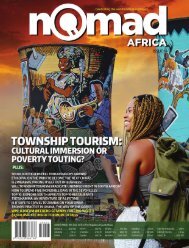Nomad_Africa_Edition12
Born from a passionate desire to dispel the negative perceptions which the world has held of the African Continent, and to replace it with a positive focus, Nomad Africa magazine celebrates life on the African continent. Covering stories from all countries and all cultures, it strives to include unique tourist attractions, business development, technology and investment opportunities as well as looking at the continent's cultural heritage. Nomad Africa inspires and breeds a conscious, knowledgeable generation of visionaries among our own, and influences positive perceptions and appreciation for the true worth of Africa worldwide.
Born from a passionate desire to dispel the negative perceptions which the world has held of the African Continent, and to replace it with a positive focus, Nomad Africa magazine celebrates life on the African continent. Covering stories from all countries and all cultures, it strives to include unique tourist attractions, business development, technology and investment opportunities as well as looking at the continent's cultural heritage. Nomad Africa inspires and breeds a conscious, knowledgeable generation of visionaries among our own, and influences positive perceptions and appreciation for the true worth of Africa worldwide.
Create successful ePaper yourself
Turn your PDF publications into a flip-book with our unique Google optimized e-Paper software.
Mzee Jomo Kenyatta’s first cabinet in 1963.<br />
conducted in Swahili, a widely spoken language.<br />
Kenyatta subsequently embarked on a huge<br />
national campaign to sensitise Kenyans on<br />
the importance of getting their own land<br />
back and seeking independence from the<br />
British authorities.<br />
The British authorities began sensing Kenyatta’s<br />
popularity and banned the KAU, triggering<br />
the formidable Mau Mau rebellion –<br />
a result of years of oppressive colonial rule<br />
and much aligned to the dispossession of<br />
rich agricultural lands that were in the hands<br />
of British settlers. However, the rebellion<br />
was eventually quelled at great cost to the<br />
British Government, failing to capture widespread<br />
public support partly due to the<br />
British policy of divide and rule as well as the<br />
protest movement remaining internally divided<br />
despite attempts to unify its various<br />
strands.<br />
The British authorities in Kenya declared a<br />
state of emergency and Kenyatta, together<br />
with other 182 <strong>Africa</strong>n leaders, was arrested.<br />
Although high-powered attorneys defended<br />
Kenyatta, he was sentenced to 7<br />
years indefinite restriction and hard labour<br />
Kenyatta subsequently embarked on a huge national<br />
campaign to sensitize Kenyans on the importance of<br />
getting their own land back and seeking independence<br />
from the British authorities. The British authorities<br />
began sensing Kenyatta’s popularity and banned the<br />
KAU, triggering the formidable Mau Mau rebellion – a<br />
result of years of oppressive colonial rule and much<br />
aligned to the dispossession of rich agricultural lands<br />
that were in the hands of British settlers.<br />
in 1953, serving his sentence in North Western<br />
Kenya, at Lokitaung. April 14 1959 marked<br />
the day Kenyatta was set free after completing<br />
his sentence, but he was still restricted<br />
by the authorities to the largest town in<br />
northwestern Kenya, Lordwar.<br />
Elections were then held in May 1963, pitting<br />
Kenyatta's KANU (Kenya <strong>Africa</strong>n National<br />
Union), which advocated for Kenya to be a<br />
unitary state against the KADU (Kenya<br />
<strong>Africa</strong>n Democratic Union), which advocated<br />
for Kenya to be an ethnic federal<br />
state.<br />
KANU defeated KADU by winning 83 seats<br />
out of 124 and on 1 June 1963, Jomo Kenyatta<br />
became the first Prime Minister of the first<br />
autonomous Kenyan government. However,<br />
after independence, Queen Elizabeth<br />
II still remained as Head of State (after Independence,<br />
styled as Queen of Kenya), represented<br />
by a British Governor-General who<br />
consistently asked white settlers not to leave<br />
Kenya and supported reconciliation. Kenyatta<br />
retained the role of Prime Minister after<br />
Issue 12 | ...Celebrating the world’s richest continent | www.nomadafricamag.com | 71





